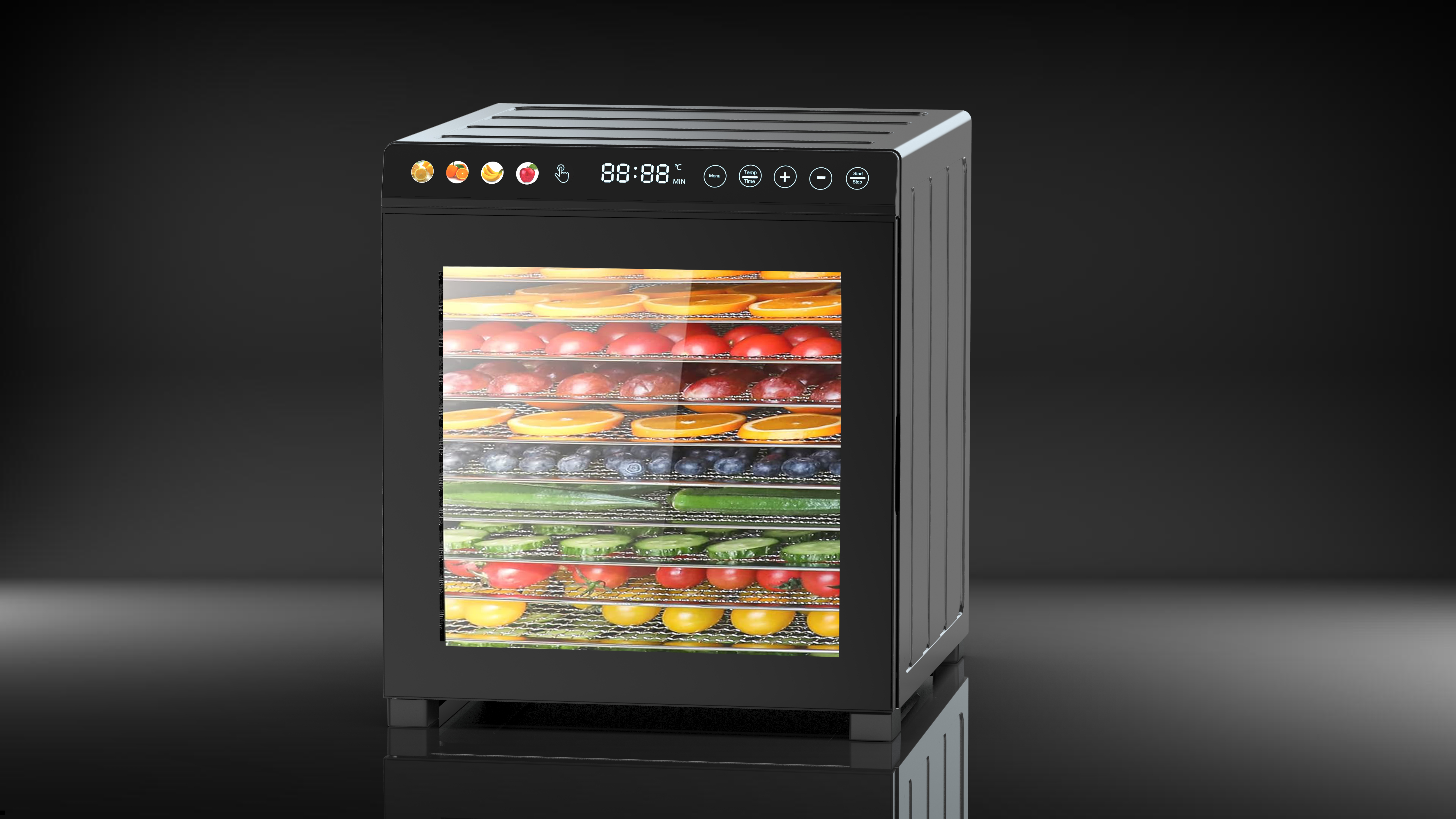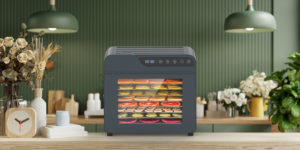As the Sales Manager at Foshan Linden Intelligent Appliances Co., Ltd., I love helping people find the best ways to preserve their fresh produce. From our factory in China, we produce top-quality food dehydrators, alongside our 12L, 16L, and 30L air fryer ovens and air fryers, exported to North America, Europe, Russia, and the Middle East. A question I often hear is: What’s the best way to preserve fresh fruits—using a food dehydrator or freezing? I’m excited to share my expertise and compare these two methods to help you make the right choice for your kitchen.
In this article, I’ll explore food dehydrators and freezing, focusing on their impact on flavor, nutrition, convenience, and cost for preserving fresh fruits. Drawing from our experience at Linden, where we design innovative appliances with customizable features, I’ll guide you through the pros and cons. Let’s dive into the world of fruit preservation and find the best method for you!
Understanding Food Dehydrators and Freezing
Both food dehydrators and freezing are popular methods for preserving fresh fruits. They extend shelf life, reduce waste, and keep your favorite fruits available year-round. However, their approaches differ significantly, affecting taste, texture, and practicality.
What Is a Food Dehydrator?
A food dehydrator removes moisture from fruits, vegetables, herbs, and more, preserving them for long-term storage. Our Linden food dehydrators use a heating element and fan to circulate warm air, maintaining flavor and nutrients. According to WebMD, dehydrated fruits retain most vitamins and minerals, making them a healthy option.
What Is Freezing?
Freezing preserves fruits by storing them at sub-zero temperatures, typically in a home freezer. This method slows spoilage by halting microbial growth. It’s a common choice for preserving fruits like berries or peaches, but it requires freezer space and can alter texture.
Why Compare the Two?
I’ve seen buyers at trade shows and on our website, lindensmart.com, weigh these options carefully. Choosing the right method depends on your lifestyle, storage needs, and preferences for taste and texture. Let’s break down how food dehydrators and freezing compare for preserving fresh fruits.
Comparing Food Dehydrators and Freezing
Let’s explore the key differences between food dehydrators and freezing, focusing on their effectiveness for preserving fresh fruits.
Flavor and Texture
Food Dehydrators: Intense Flavor, Unique Texture
Our food dehydrators concentrate the natural sugars in fruits, creating intense, sweet flavors. For example, drying apples or mangoes produces chewy, flavorful snacks. The texture is distinct—firm or chewy, not juicy—but many customers love this for snacking or baking. Healthline notes that dehydration enhances flavor by removing water, leaving concentrated taste.
Freezing: Preserves Juiciness, May Soften
Freezing keeps fruits closer to their fresh state, retaining juiciness when thawed. However, freezing can cause cell damage, leading to softer textures, especially in delicate fruits like strawberries. Customers often notice a mushy consistency in thawed fruits, which may not suit all recipes.
Nutritional Value
Food Dehydrators: High Nutrient Retention
Dehydrating preserves most vitamins and minerals, as per WebMD. Our food dehydrators use low temperatures (95–165°F) to protect nutrients, making dried fruits a healthy choice for snacks or trail mixes. For instance, dried apricots retain vitamin A and fiber, perfect for long-term nutrition.
Freezing: Good but Variable Retention
Freezing retains many nutrients but can degrade some, like vitamin C, over time, according to Healthline. Fruits stored for months may lose nutritional value, especially if not properly sealed to prevent freezer burn.
Storage and Shelf Life
Food Dehydrators: Long-Term, Space-Saving Storage
Dried fruits are lightweight and compact, requiring no refrigeration. Stored in airtight containers, they can last 6–12 months or longer, per Consumer Reports. Our food dehydrators make it easy to preserve large batches, saving pantry space and reducing waste.
Freezing: Limited by Freezer Space
Frozen fruits require constant freezer storage, which can be a challenge for small households. They typically last 8–12 months, but freezer burn can affect quality if not sealed properly. Freezers also consume ongoing energy, unlike shelf-stable dried fruits.
Convenience and Ease of Use
Food Dehydrators: Set-and-Forget Simplicity
Our food dehydrators are user-friendly. Slice your fruits, place them on trays, set the temperature, and let the appliance do the work. With preset modes and adjustable timers, they’re perfect for busy schedules. Cleanup is easy with removable, dishwasher-safe trays, saving you time.
Freezing: Quick Prep, Ongoing Maintenance
Freezing is simple—wash, cut, and freeze fruits in bags or containers. However, it requires planning to avoid freezer burn, such as using vacuum-sealed bags. Thawing fruits takes time, and improper storage can lead to ice crystals or flavor loss.
Cost and Energy Efficiency
Food Dehydrators: Upfront Cost, Low Ongoing Expenses
Our food dehydrators have an initial cost but are energy-efficient, using 0.6–1 kWh per use, per Energy Star. Drying a batch of apples takes 6–8 hours, with minimal power draw. Once dried, fruits require no further energy for storage, making this a cost-effective long-term solution.
Freezing: Ongoing Energy Costs
Freezing has low upfront costs if you already own a freezer. However, freezers run continuously, consuming 0.5–1 kWh daily, depending on size and efficiency. This adds up over months, making freezing less economical for long-term preservation.
Versatility for Fruit Preservation
Food Dehydrators: Beyond Fruits
Our food dehydrators are versatile, handling fruits, vegetables, herbs, and meats. For fruits, you can create snacks, fruit leather, or dried ingredients for baking. Adjustable temperature settings (90–165°F) ensure optimal drying for delicate fruits like berries or heartier ones like apples.
Freezing: Limited to Fresh-Like Uses
Freezing is best for fruits used in smoothies, jams, or baking, where texture changes are less noticeable. It’s less suited for snacking, as thawed fruits often lose their firmness. Freezing also limits you to recipes that work with soft or juicy textures.
Practical Applications for Preserving Fruits
Both methods have unique strengths. Here’s how they fit into everyday fruit preservation, based on feedback I’ve received from customers.
Food Dehydrators: Ideal for Snacking and Portability
Our food dehydrators shine for creating portable, shelf-stable snacks. Dry apples, bananas, or strawberries for healthy on-the-go treats. They’re perfect for school lunches, hiking, or travel, with no refrigeration needed. Customers love using dried fruits in granola or baking for added flavor.
Freezing: Great for Cooking and Smoothies
Freezing is excellent for fruits used in cooked or blended recipes. Frozen berries work well in smoothies, pies, or sauces, retaining their vibrant color. However, thawed fruits may not suit fresh salads or snacking due to texture changes.
Environmental Impact
I’m passionate about sustainable choices. Let’s compare the environmental footprint of these methods.
Food Dehydrators: Eco-Friendly Long-Term
Our food dehydrators use minimal energy during operation and none for storage. They reduce food waste by preserving overripe fruits, contributing to a smaller environmental footprint. Their durability, backed by UL and CE certifications, ensures years of use.
Freezing: Higher Energy Use
Freezers require constant energy, increasing your carbon footprint over time. While effective for preservation, they’re less eco-friendly, especially for households with limited freezer space that may need additional units.
Which Method Is Best for You?
Choosing between a food dehydrator and freezing depends on your needs. Here’s how to decide, based on my experience with buyers.
Choose a Food Dehydrator If You:
- Want shelf-stable, portable fruit snacks.
- Prefer intense flavors and chewy textures.
- Need to preserve large batches without refrigeration.
- Value versatility for drying other foods like herbs or meats.
- Seek an eco-friendly, low-energy solution.
Our Linden food dehydrators are perfect for these needs, offering customizable settings and spacious trays for efficient preservation.
Choose Freezing If You:
- Prefer fruits with fresh-like juiciness for smoothies or cooking.
- Have ample freezer space and don’t mind ongoing energy costs.
- Need quick preservation without upfront appliance costs.
- Plan to use fruits in recipes where texture changes are less noticeable.
Can You Use Both Methods?
I often tell buyers they can combine both methods. Freeze fruits for smoothies or baking, and use our food dehydrators for snacks or long-term storage. This approach maximizes flexibility, letting you enjoy fruits in various forms year-round.
Quality and Reliability of Our Food Dehydrators
At Linden, quality is non-negotiable. Our food dehydrators undergo rigorous testing to meet UL and CE standards, ensuring safety and performance. Their durable, food-safe materials guarantee long-lasting use, making them a trusted choice for fruit preservation.
Logistics and Support
From my experience with global buyers, logistics matter. Our food dehydrators are lightweight and easy to ship, ensuring timely delivery worldwide. We streamline production to meet tight schedules. Have questions? I’m here at sales4@fslinden.com to help.
SEO-Friendly Tips for Preserving Fruits
To choose the best preservation method, here are tips optimized for search terms like “food dehydrators vs freezing” or “preserving fresh fruits”:
- Define Your Needs: Decide if you want snacks or fresh-like fruits.
- Check Storage Space: Ensure you have room for frozen or dried fruits.
- Consider Energy Costs: Compare ongoing freezer costs to one-time drying.
- Read Reviews: Explore platforms like CNET for user insights.
- Test at Trade Shows: Try appliances hands-on for confidence.
Final Thoughts: The Best Way to Preserve Fruits
As someone who loves helping people enjoy fresh fruits year-round, I believe our food dehydrators are often the best choice for preserving fruits. Their versatility, energy efficiency, and ability to create shelf-stable snacks make them ideal for most home cooks. Freezing is great for specific uses like smoothies, but it requires more space and energy. Your choice depends on your lifestyle, storage options, and flavor preferences.
Ready to preserve your favorite fruits? Visit lindensmart.com to explore our food dehydrators, or email me at sales4@fslinden.com for expert advice. Let’s keep your fruits delicious and nutritious all year!
Meta Title: Food Dehydrators vs Freezing: Best for Preserving Fruits
Meta Description: Compare food dehydrators and freezing for preserving fresh fruits. Learn about flavor, nutrition, and efficiency to choose the best method.




